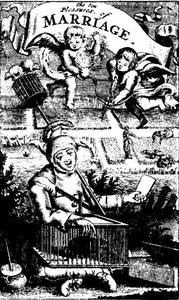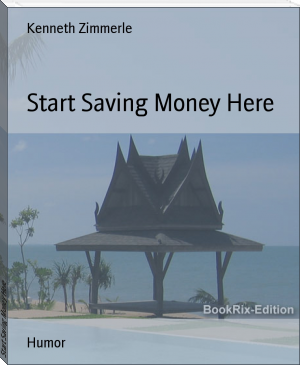The Ten Pleasures of Marriage<br />and the Second Part, The Confession of the New Married Couple by A. Marsh (best ebook reader TXT) 📗

- Author: A. Marsh
Book online «The Ten Pleasures of Marriage<br />and the Second Part, The Confession of the New Married Couple by A. Marsh (best ebook reader TXT) 📗». Author A. Marsh
But there can be no doubt of the English character of the text both in general and in detail. It is redolent of English middle-class life as it was in the days before our grandfathers decided that the human body was an obscene thing and its functions deplorable. It has the middle-class love of good food—Colchester oysters (famous then as now), asparagus, peaches, apricots, candied ginger, China oranges, comfits, pancakes—enough to make the mouth water. It has the solid English furniture, with all its ritual of solemnity; "vallians" (valences), "daslles" (tassels), big bedsteads, Chiny-ware, plush chairs, linen cupboards. It has all the fuss of preparation for childbirth—the accumulations of wrappings, the obstetric furniture, the nods and winks of the midwife and the gossips, authentic ancestors of Mrs Sarah Gamp and Mrs Elizabeth Prig—why, the haste to fetch the midwife at the crisis might almost be the foundation upon which Dickens built the visit of Seth Pecksniff, Esq., to Kingsgate Street, High Holborn.
It has likewise many touches which show knowledge of the average fairly prosperous English life—the merchant's, the shopkeeper's, the sea-captain's. The author clearly knew the routine of trade. He knew that at New Year's Day the "day-book" had to be fully written up for scrutiny and stock-taking and sending out of accounts. (But the pleasures or torments of love are such that "the squire is so full of business that he can't spare half-an-hour to write it out." The brief description of his feelings which follows, conventional, perhaps, to some extent, has a certain life in it, as if the writer, embittered, was recalling his own youthful experience.) He knew, too, what to-day we only know in the mass through the newspapers, that a merchant's business depends not only upon watching the markets, but upon the actual supply of material—"what commodities are arrived or expected," and whether tea is up ½d. or tin ¾d. down, or if hogs closed firm. The commercial world changes only its methods of communication and expression.
The first chapter, indeed, is of genuine historical and literary interest. From the literary point of view, it is a near descendant—collateral, if not direct, and anyhow based on the same English empirical humour of life—of Thomas Overbury's A Wife (1614—only one unique copy of this is known to exist), John Earle's Microcosmographie (1628), in prose, and Thomas Bastard's Chrestoleros* (1598), in verse. It is an early instance of the stringing together, in a connected narrative, of the material previously used only in short sketches or "characters"; and so it is directly in the succession which in the end produced what is perhaps the most enduring and individual phenomenon in our literature—the English novel.
* A copy of the very rare first edition fetched £155 at the Britwell sale in February 1922.
Of course the book says things we do not say now openly—though the traditional corpus scriptorum nondum scriptorum which almost all men and even some women know is handed on, a rather noisome torch, from generation to generation, solely by word of mouth, and flickers now and again in The Ten Pleasures. But they were said openly then, and by great writers. There is nothing here so nauseatingly indecent as the viler poems of the Rev. Robert Herrick and the Very Rev. the Dean of Dublin, Jonathan Swift, D.D. There are salacious hints, there are bawdy words, but no more than Falstaff or the wife of Bath or the Summoner or Tom Jones might have used—less, on the whole. There is no need, to borrow a phrase from the book's sequel, to "make use of the gesture of casting up the whites of the eyes." "True-hearted souls will solace their spirits with a little laughter, and never busy their brains with the subversion of Church and State government."
Certainly the writer favoured the jovial life. Food and wine flow in his pages like milk and honey in Canaan. There is no room in his house for the Puritans, not even, apparently, in the bringing up of his child. "Those that frequent Mr Baxter's Puritanical Holding-forth" must be merry when they come to his feast. He will have no Catechizing of Families—a discourse published by Richard Baxter in this very year 1683; and the only Compassionate Counsel—a Baxter pamphlet of 1681—he is likely to offer to young men is to take life lightly, as his hero does, and above all, not to marry.
For that is the true point of this lively piece of irony (the irony is less well sustained in the sequel, The Confession of the New Married Couple, and dropped altogether in the bitter Letter at the end of The Ten Pleasures). It is a savage attack upon women—upon (to quote a Rabelaisian sentence) "the quarrelsome, crabbed, lavish, proud, opinionated, domineering and unbridled nature of the female sex." Women, he says, "are in effect of less value than old Iron, Boots and Shoes, etc., for we find both Merchants and money ready always to buy those commodities." The analogy is an unfortunate one, for one of his implications is that women can easily be bought. But he—if it is a "he"—is in deadly earnest. Love, marriage, he asks scornfully—what are they? A romance, are they? The true happiness of life? Very well: here are the pleasures of them. You will be in love and make a match—and look at all the worry of the settlement, in which, by the way, you may often be defrauded. You will get married—a fine ceremony, with a fine feast; and all the nasty old women of the neighbourhood will come and tell bawdy stories to enliven the occasion. You get married, and thereafter you are at the mercy of your wife, who will indulge your wishes or not as suits her mood. Your house will be all awry if she has but a slight headache. When the baby comes, the place will be filled with old women and baby-linen and medical apparatus, and you will have all the anxieties of a father added to the discomforts of a neglected husband. For the rest, your wife will know how "to cuckold, jilt, and sham" as well as any gay lady of Covent Garden. And so on.
Much of the satire is acute and well-turned, often novel in expression if not in thought. But it is, as has been suggested, in the picture of English middle-class life under James II. that the importance of the book lies. Here is the domestic side of what the great diarists and the great poets hint at, and the excess of which municipal records, those treasuries of private appearances in public, chronicle with the severity of judgment. You have the young couple going (alas that the river for this purpose has, so to speak, been moved farther up its own course!) for a row on the Thames, with Lambeth, Bankside and Southwark echoing to their laughter. They might visit the New Spring Gardens at Vauxhall; but they would probably avoid the old (second) Globe Theatre on Bankside, for it was a meeting-house at which the formidable Baxter preached. Or they might go into Kent and pick fruit, even as "beanfeasters" do to this day; or to Hereford for its cider and perry, the drinking of which is a custom not yet extinct. Or maybe only for an outing to the pleasant village of Hackney. They would see the streets gay with signs which (outside Lombard Street) few houses but taverns wear to-day—the sign of the Silkworm or the Sheep, or that fantastic schoolmaster's emblem, the Troubled Pate with a crown upon it. And when they stopped for rest at the sign of a bush upon a pole, how they would fall to upon the Martinmas beef, the neats-tongues, the cheesecakes! It is true they might find prices high and crops poor; but such things must be.... "This is the use, custom, and fruits of war. If the impositions and taxes run high, the country farmer can't help that; you know that the war costs money, and it must be given, or else we should lose all." Had they learnt that as long ago as 1682?
As a genre work the book is not unique; rather is it typical. The gradual social settlement after the Civil War, destined to develop into stagnation under the first Georges, caused didactic works, guides to manners, housewifery and sport, society handbooks, to proliferate. The Ten Pleasures mentions some standard works, which every good housewife would probably possess—Nicholas Culpepper's medical handbooks, for instance, and The Complete Cook, which indeed, as part of The Queen's Closet Opened, had reappeared in its natal year 1682-1683. The same year saw the birth of such works as The Complete Courtier, The Complete Compting House, The Gentleman Jockey, The Accomplished Ladies' Delight. Life was being scheduled, tabulated, in readiness for the complacent century about to open. It was also being explored, not only in such works as The Ten Pleasures and The Woman's Advocate, but in others (entered as published, but in many cases not known to be now extant) like The Wonders of the Female World, The Swaggering Damsel, or Several New Curtain Lectures, and Venus in ye smoake, or, the nunn in





Comments (0)